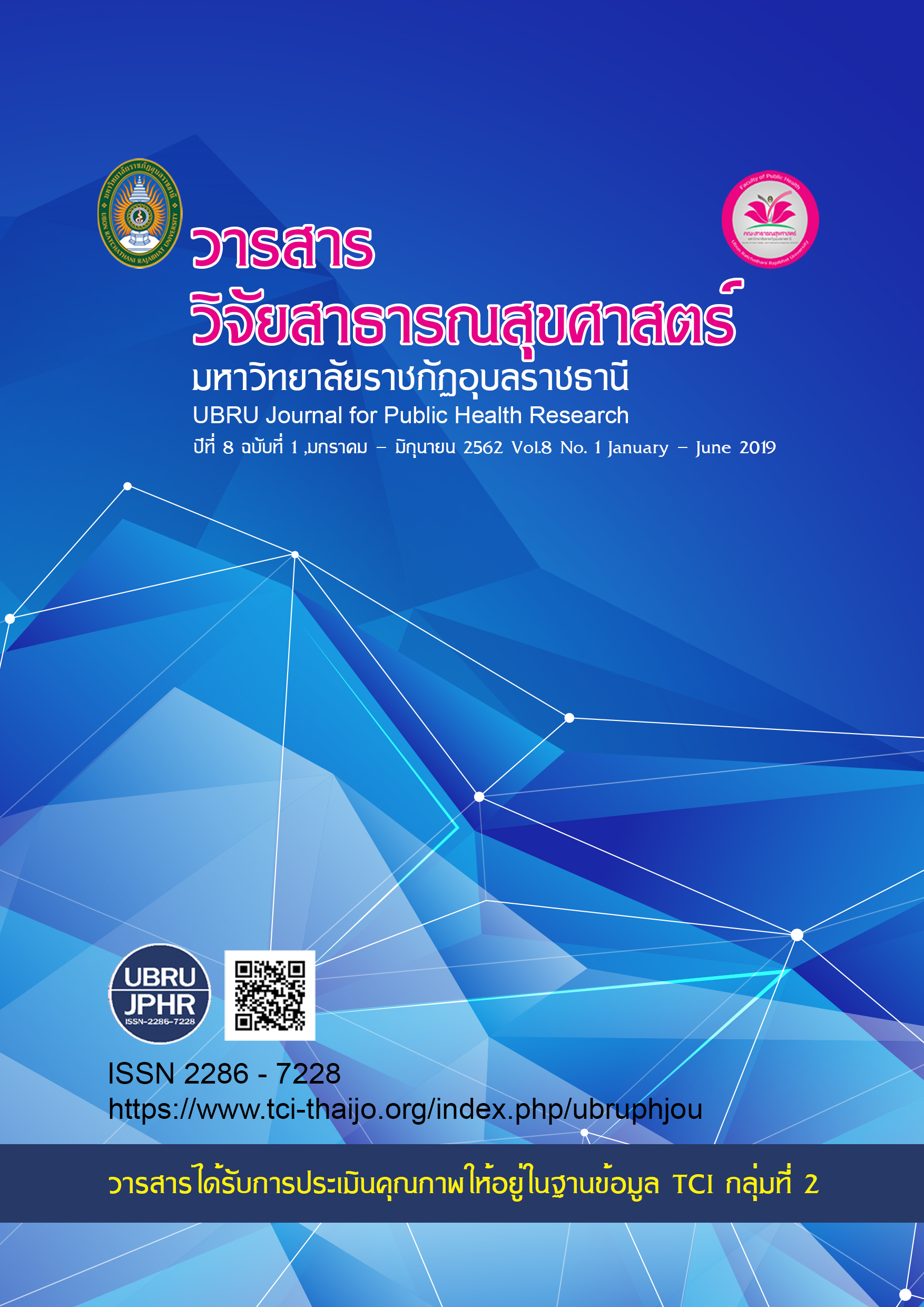The environmental and health impact of recyclable waste shop on the community; case study of Ban Kok, Khueng Nai, Ubon Ratchathani
Keywords:
recyclable waste shop, environment, communityAbstract
The recyclable waste business is rising around the world because of developing and high consumption increase more waste. However, in developing country this business is occurred in informal recycle sector with traditional or inappropriate sorting process. These concerned about environmental and health impact on the worker, and people in their community. In Ubon Ratchathani, many local recyclable waste shops are established in Ban Kok community, Amphur Khueng Nai for over 20 years. Thus, this research aimed to study environmental and health impact of recyclable waste shop on the community, by survey and interviewed. The result showed 61 recyclable waste shops were spread over the community area, composed of various types; whole recyclable waste, plastic waste, electronics waste, motorcycle waste, automobile waste, and medical waste. The residents faced problems from waste, such as air pollution, pest and animal-borne disease disturbing, unsanitary waste straggle, and pollution effect on agricultural production from recyclable waste activities as 66.84%, 54.55%, 36.90%, and 36.10%, respectively. Most people in the community concerned about effect on their health 72.46%. Also, the residents have health effect, or ever sick from recyclable waste shop as 31.02%.
References
Chiraporn Lapkham, Chuleeporn Thepsaeng, Thitima Wonthong. (2016). Health Impact Assessment of Communities Near The Landfill Site of Warinchamrab Municipality, Ubon Ratchathani Province. J Sci Technol MSU, 35(5), 581-586.
Foday Pinka Sankoh, Xiangbin Yan, Quangyen Tran. (2013). Environmental and Health Impact of Solid Waste Disposal in Developing Cities: A Case Study of Granville Brook Dumpsite, Freetown, Sierra Leone. Journal of Environmental Protection, 4(7): 665-670.
Giusti, L. (2009). A review of waste management practices and their impact on human health. Waste Management, 29 (8); 2227-2239.
Jutharat Boontho , Thitiya Netsanga, Kanayrath Saita, and Nilobol Kongpirun. (2008). Effects of Refuse on People’s Health A Case study of Ban Khambon, Nonton, Muang, Khon Kaen. RMUTI journal, 1, 50-56.
Pollution Control Department. (2017). Reduce Reuse Recycle: 3R Strategy. [Internet]. Retrieve May, 15, 2018.From http://infofile.pcd.go.th/law/DraftStrategic3R.pdf?CFID=1145597&CFTOKEN=12734727.
Pollution Control Department. (2018). Annual report of pollution in Thailand, 2017. [internet]. March, 23 2018.From http://infofile.pcd.go.th/pcd/PressRelease_2017.pdf?CFID=1145597&CFTOKEN=12734727.
Ramesh Babu, B., Parande A.K., Ahmed Basha, C. (2007). Electrical and electronic waste: a global environmental problem. Waste Manag Res, 25(4):307-18.
Waste management world. (2011). Thai Style Recycling. [internet]. Retrieved July, 4 2018. From https://waste-management-world.com/a/thai-style-recycling.
Downloads
Published
How to Cite
Issue
Section
License
เนื้อหาและข้อมูลในบทความที่ลงตีพิมพ์ในวารสารวารสารวิจัยสาธารณสุขศาสตร์ มหาวิทยาลัยราชภัฏอุบลราชธานี ถือเป็นข้อคิดเห็นและความรับผิดชอบของผู้เขียนบทความโดยตรงซึ่งกองบรรณาธิการวารสาร ไม่จำเป็นต้องเห็นด้วย หรือร่วมรับผิดชอบใดๆ
บทความ ข้อมูล เนื้อหา รูปภาพ ฯลฯ ที่ได้รับการตีพิมพ์ในวารสารนี้ ถือเป็นลิขสิทธิ์ของวารสารฯ หากบุคคลหรือหน่วยงานใดต้องการนำทั้งหมดหรือส่วนหนึ่งส่วนใดไปเผยแพร่ต่อหรือเพื่อกระทำการใดๆ จะต้องได้รับอนุญาตเป็นลายลักอักษรณ์จากบรรณาธิการวารสารนี้ก่อนเท่านั้น

